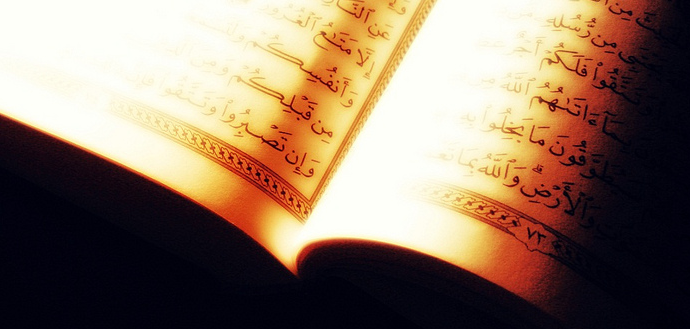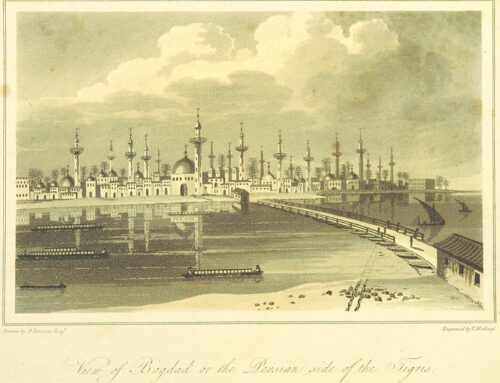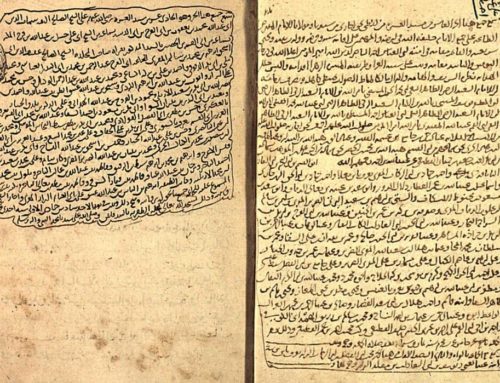Translated by Ismaeel Nakhuda
Part Two
Shaykh al-Islam Mawlana Husayn Ahmad Madani (may Allah enlighten his resting place) has also stressed in his letters that the original purpose of Suluk is ihsan. In one epistle he writes, “My respected one. The original purpose of Suluk is ihsan — ‘that you worship Allah as if you are seeing him’ (Al-Hadith). In other words an ingrained ability [of ihsan] should develop in the salik and this should be [the condition] at the beginning. As to [the condition at] the end, then that is acquiring the pleasure of He Whose Name is Powerful. (Shaykh al-Islam then writes a poem, the translation of which is as follows. Translator). ‘Why do you seek firaq and wasl? Seek the pleasure of the beloved, as wishing from the beloved something apart from Him is regretful.’
“Hence, it is necessary to strive until real love of Allah develops and it increases to a level that the heart disconnects from everything apart from He. This, its aids and means, all of them, are just mediums. The spiritual exercises (riyadah) and correcting manners (islah al-akhlaq) are also from this type. The earlier Sufis considered correcting manners more important and at times spent years on this, the outcome of which would be that at times death would come before they reached Allah and a person would have to leave the world deprived of this blessing. The latter Sufis pondered over this, they consider reaching Allah (wusul) and turning to the Pure Being more important, and encourage [the saliks] to engross themselves in joining [with Allah], which then results in [His] continuous presence (hudur), and by this the connection becomes strong and ingrained. On account of this, the reprehensible traits (al-akhlaq al-dhamimah) and spiritual illnesses (al-radha’il) disappear one after another. Anyway, strive to always remain attentive to the Pure Being — this can be solely to His Being or to a quality of His from His many Perfect Qualities — and establish the situation of ‘those who are regular in their salah‘ (Qur’an 70:23). It is natural for there to be shortcomings in man’s actions. However, it is incumbent upon man to strive to remove those defects and to sincerely recite ‘from You alone do we seek help’ (Qur’an 1:5) in each prayer. The Noble Prophet (may Allah bless him and grant him peace) would supplicate: ‘We have not recognised you as you deserve to be recognised and we have not worshipped you as you deserve to be worshipped.’ The purpose is that it is necessary that one always strives to complete actions and achieve perfect sincerity. Always sincerely seek forgiveness in the court of Allah while admitting shortcomings that are a reality. It is also necessary that, while hoping for acceptance, one always remains fearful of the anger of His Most High. ‘Faith is between fear and hope.’
“Adhere to the Sunnah at all times in all matters. Apart from the known meditations (muraqabah) and although there is no need for other dhikr, perform whichever dhikr you feel appropriate for strength and support. Study the book Sirat al-Mustaqim and Imdad al-Suluk.” (Maktubat-e-Shaykh al-Islam, volume 3, letter 66)
In another lengthy letter, he writes: “Always keep your eyes and heart focused on following the Shari’ah and the Sunnah of the Prophet (may Allah bless him and grant him peace) as much as possible. Do not be negligent in dhikr. Always remain repentant and remorseful over one’s negligence (ghaflah) and sins. Do not waste this precious life.”
(Shaykh al-Islam then writes a poem in Persian the translation of which is as follows. Translator).
“All that you do, save the dhikr of the Beloved, is worthless,
And all that you read, save the secrets of love, are worthless,
Sa’di, wash everything save from the Truth from the slate of your heart,
All knowledge that does not take you to Allah is ignorance.”
(Maktubate-e-Shaykh al-Islam, volume 3, letter 69)
In a letter before he writes: “Is it not true that you have abandoned the prescribed dhikr? Feeling energetic at times you do it for one or two months and then abandon it. Is it not true that you do not offer the five prayers with congregation? Is it not true that you allow compulsory prayers to lapse beyond their prescribed times? You sleep so much that the sun comes out. Do these types of occurrences not pain your well wishers and friends? Anyway, it is necessary for you to rectify yourself. Strive to follow the Shari’ah and revive the Sunnah. You become attentive when difficulties befall you and when Allah removes the hardships, you become free of worry. Make dhikr your habit as much as possible. (Maktubat-e-Shaykh al-Islam, volume 2, letter 70)
In another letter he writes: “The condition that your respected self has written is satisfying and one of hope. Al-istiqamah fawq al-karamah (Steadfastness is above miracles). Dreams, lights and revelations (ilham) etc. only come to the saliks to strengthen the heart in the same way children are given toys to keep them happy. The saying of the Akabir, tilka ‘l-khayalat turabba biha atfal al-tariqah (these are all thoughts through which the children of tariqah are reared) is well known. Persevering in worship and dhikr, and following the Sunnah and Shari’ah are those actions that we are required to do; acting upon them with determination and acquiring the status of ihsan is perfection of faith. Fear of Allah and hope are both signs of perfect faith. The prevailing [feeling] of crying and weeping is the appearance of the Chishti nisbah. Oh Allah, increase it more.” (Maktubat-e-Shaykh al-Islam, volume 2, letter 70)
In an epistle before, he writes: “Respected one. Worldly difficulties are also His mercy by which the slave is drawn towards Him or else the slave would, like Fir’awn, shout out without any basis that ‘I am your supreme cherisher’. The verse ‘Should Allah expand the provision for His servants (to its full extent), they would spread mischief on earth’ (Qur’an 42:27) is proof of this. In addition, tribulations and tests are existent in both situations — in the situation of worldly fortune and abundance, and in the condition of difficulty and hardship. ‘And We test you through bad and good (situations) with a trial’ (Qur’an 21:35). Allah Most High says at another place, ‘We tested them with good and bad times’ (Qur’an 7:168).
“The purpose of the above is that this world is a place of testing and a place where all sorts of tribulations come. There should be concern about passing them. There is none, apart from the real Master Who is eternal, to whom one should attach his heart. Whatever action you do, then do it with the proper intention and make it an act of worship. ‘Actions are according to intentions’ (Al-Hadith). Sleeping, eating, drinking and fulfilling one’s human needs can all become acts of worship. The means and channels for worship are all definitely acts of worship. The original purpose of dhikr and fikr is the pleasure of the original Beloved. As to acquiring some pleasure, the heart being purified, receiving some kashf or karamat (miracle), sensing lights and blessings, fana (annihilation) and baqa, and being a qutb or ghawth, then all of this is not the purpose. In fact, paying attention and aspiring to acquire them is very dangerous. (Shaykh al-Islam then writes a poem in Persian the translation of which is as follows. Translator). ‘Why do you seek firaq and wasl? Seek the pleasure of the beloved, as wishing from the beloved something apart from Him is regretful.’
“The above-mentioned issues are means and mediums. The original purpose is only the pleasure of Allah. It is incumbent on a slave to bring about the etiquettes of being a true slave of Allah (‘ubudiyyah). Continue to strive in this and make sincerity your purpose at all times.” (Maktubat-e-Shaykh al-Islam, volume 3, letter 59, page 129)
In another letter he writes, “This dear life and its moments are precious gems. We are wasting them in our unmindfulness — what will the result of this be apart from the wringing of hands in regret? What will happen when we will be told, ‘Did We not give you an age in your life in which a lesson could have been learnt by the one who wished to take lesson? And (furthermore) the warner had (also) come to you. So, taste, because the wrongdoers will have no supporter’ (Qur’an 37:35).
“My respected one! How foolish is it to waste these precious moments on account of friends and dear ones. Understand this having thought and pondered over it. These gatherings of play and merry seem nice today. However, when close to death and after death, one will curse them a thousand times over. Lessen them to a degree that is however possible. Contemplate [this verse] ‘O you who believe, your riches and your children must not divert you from the remembrance of Allah. And those who do that are the losers’ (Qur’an 63:9). Do not throw behind you [the verse] ‘Wealth and children are the embellishment of the worldly life, and the everlasting virtues are better with your Lord, both in rewards and in creating good hopes’ (Qur’an 18:46). This youth and the present health is an immense blessing. Do not let them go to waste. (Shaykh al-Islam then writes a poem the translation of which is as follows. Translator). ‘Every moment of this life is for your service and wishes to serve you. If you cannot understand this then this is your ignorance. Do not waste these excellent moments and do not spread heedlessness in the city of the soul.’
“The Prophet (may Allah bless him and grant him peace) said: ‘There are two blessings in which many people are at loss: health and free time.’ Value this and increase [the exercise of] Pas Anfas [1]Pas Anfas (Guarding the Breath) is a Sufi shughl (exercise) designed to enable the Sufi to perform the dhikr of Allah with each breath (translator). to such a degree that it happens at all times without any intention or choice and after that the dhikr of the heart begins to flow and the way to advancing in Suluk clears. Do not delay. Keep in view the following of the Sunnah in each action.” (Maktubat-e-Shaykh al-Islam, volume 2, letter 48, page 188)
The writings of the Akabir are explicit that the original purpose [of Tasawwuf] is acquiring the state of ihsan, and that the struggles and spiritual exercises that have been prescribed by the Sufis have been devised for the ailments of the hearts in the same way doctors prescribe new types of medicine for new forms of physical illnesses. In the same way there is no doubt regarding physical medicines that they may be bid’ah, to consider spiritual medicines bid’ah is ignorance. They are not the original purpose. They are special methods of remedy for particular illnesses.
‘Allamah Ibn Taymiyyah (may Allah mercy him) has carried out a detailed discussion on the actions of the heart in his book Al-Tuhfah al-‘Iraqiyyah fi ‘l-‘Amal al-Qalbiyyah. He writes, “These are a few words explaining the actions (a’mal) of the hearts, which are defined as stations (maqamat) and spiritual states (ahwal). They are from among the fundamentals and foundations of faith and religion [and include] for example the love of Allah and His Prophet, trust in Allah (tawakkul), sincerity (ikhlas), thankfulness (shukr), patience (sabr), fear (khawf) and hope (raja). The imams are agreed that all of these actions are incumbent on the entire creation. People are in relation to them of three types in the same way that they are of three types in relation to the actions of the body: [1] zalim, [2] muqtasid and [3] sabiq bi ‘l-khayrat.
“Zalim is the one who abandons that which he has been ordered and does that which he has been forbidden from doing; muqtasid is he who performs incumbent actions and avoids those actions that are haram; and sabiq bi ‘l-khayrat is he who gains proximity to his utmost by means of performing the fard, sunnah and mustahab actions, and avoids that which is haram and makruh. Even though the muqtasid and sabiq bi ‘l-khayrat can commit sins — which can be forgiven by way of tawbah (repentance), the performance of good deeds, or by the infliction of some difficulty — both of these [categories of people] are from the friends of Allah (awliya) who have been mentioned in the book of Allah in the verse, ‘Listen, the friends of Allah shall have no fear, nor shall they grieve, those who have believed and have been fearful of Allah’ [Qur’an 10:62/63]. Because of this, the friends of Allah are god-fearing believers. They are of two types: ‘Am (general) and khas (specific). The ‘am are the muqtasidin and the khas are the sabiqin bi ‘l-khayrat …”
After this ‘Allamah ibn Taymiyyah continues until the end of the book with a concise but detailed discussion on the esoteric actions. He writes that honesty (sidq) and dishonesty (kidb), love of Allah, being sincere to Him, trust (tawakkul) in Him and other esoteric actions are all, in terms of Shari’ah, imperative. Trust in Allah and seeking His aid takes a person to his goal. Shaykh Ibn Taymiyyah then carries out a detailed discussion on tawakkul and outlines that the most supreme, greatest and sublime of things from among the duties of iman is the love of Allah and the love of His Prophet (may Allah bless him and grant him peace). He then mentions the characteristics of he who loves Allah and those who are His beloved, and that the love of Allah is the original action of faith and that hope (raja) and fear (khawf) etc. are the inevitable consequences of the love of Allah Most High. He also mentions the speech of the early Sufis regarding the love of Allah Most High, and that the definitive result of the love of Allah Most High is following His Prophet (may Allah bless him and grant him peace) and that following the Prophet exoterically and esoterically creates the love of Allah Most High. He has written at length on other issues. The entire book is worthy of being read.
He has also mentioned in his fatwas (page 225, part 11): “And likewise he who says, ‘Certainly, Muhammad was sent with the exoteric knowledge (‘ilm al-zahir) and not the esoteric knowledge (‘ilm al-batin),’ then such a person has brought faith on a portion of what the Prophet has brought and disbelieved a portion, hence he is a kafir. This is a worse form of disbelief than those others. For the esoteric knowledge — which is the knowledge of the iman of the hearts and their gnosis (ma’rifah) and states (hal) — is the knowledge of the esoteric realities of iman; this is greater than knowledge of only the exoteric actions of Islam.”
Hafiz Ibn Qayyim (may Allah mercy him) has mentioned the prerequisites of the shaykh in Al-Wabil al-Sayyib min al-Kalim al-Tayyib, a treatise on the condition of the Sufis and their dhikr, litanies and merits(page 69): “When a person intends to follow a man then let him see: Is he from among the people of remembrance (dhikr) or the people of heedlessness (ghaflah)? Are [his] desires (hawa) in control of him or revelation (wahi) [in control of him]? If [his] desires are in control of him and he is from the people of heedlessness then his behaviour has exceeded the limits … It is hence advised for a man to look at his shaykh, his exemplar (qudwah) and followers. If he finds him as such then he should remain far from him. If he finds him from those upon whom the dhikr of Allah Most High and the following of the Sunnah is supreme, and not extreme in his matters but prudent, then let him hold tight to him. The only difference between the alive and the dead is by way of dhikr. The example of he who remembers his Cherisher and he who does not is the example of the alive and the dead.”
Hafiz Ibn Qayyim has also mentioned that Shaykh al-Islam Ibn Taymiyyah said, “Dhikr for the heart is like water for the fish. What would the condition of the fish be when it leaves water?” He also mentioned: “I was once in the presence of Shaykh al-Islam Ibn Taymiyyah. He performed the Fajr prayer and then sat in the dhikr of Allah Most High until close to midday. Then he turned to me and said, ‘This is my breakfast; if I wasn’t to take my breakfast then I would lose strength’, or some words similar to this. He once said to me, ‘I do not leave dhikr except for the intention of giving my nafs strength and rest so that I may prepare for the next dhikr,’ or some words similar to this.”
Hafiz Ibn Qayyim wrote Madarij al-Salikin on Tasawwuf which is a commentary of Shaykh Abu Isma’il ‘Abd Allah al-Hirawi al-Hanbali al-Sufi’s (d.481) famous book on Tasawwuf, Manazil al-Sa’irin. This book in its entirety is regarding Tasawwuf and the condition of various Sufis. He writes: “The servitude of the man is divided over the heart, the tongue and the remaining limbs of the body. From among those issues that are incumbent on the heart there are: sincerity (ikhlas), trust (tawakkul), love (muhabbah), patience (sabr), penitence (inabah), fear (khawf), hope (raja), firm belief (tasdiq al-jazim) and true intention (al-niyyah al-sadiqah). The Ummah has agreed that these actions of the heart are incumbent (wajibat).” He then mentions some disputed incumbent actions such as being content with destiny (rada bi ‘l-qada), serenity in prayer (khushu’ fi ‘l-salah), and whether it is incumbent to repeat a prayer if there is no serenity. After this he mentions those actions that one should abstain from. He writes: “They are of two types: disbelief (kufr) and disobedience (ma’siyah). Examples of kufr include having doubts, hypocrisy and polytheism etc. And disobedience is also of two types: major and minor. Major disobedience is such as making a show (riya), vanity (‘ujub), pride (kibr), boasting (fakhr), haughtiness (khuyala), feeling hopeless [of the mercy of Allah] (qunut), to not fear the punishment of Allah, pleasure when a Muslim is harmed, expression of joy when they are afflicted with trouble, to spread indecency among Muslims, to be jealous of Muslims, and other such sins that are worse than adultery and drinking wine etc. If the heart is not cleansed then it will become foul and when the heart becomes foul then the entire body will also become foul. The rectification of the heart comes before the rectification of the limbs. If the heart’s purification is ignored then the heart will become filled with illnesses.” He has carried out a detailed discussion until the very end. It is for the rectification of these very issues that the shaykhs of Tasawwuf instruct their murids to carry out spiritual exercises and struggles.
Mawlana ‘Ashiq Ilahi Mirathi writes in Qutb al-Irshad Mawlana Gangohi’s (may Allah enlighten his grave) biography, Tadhkirah al-Rashid (page 11, volume 2): “I came across a paper that Qutb al-Irshad Mawlana Gangohi (may Allah sanctify his secret) wrote with his own hand when he was young. It is unknown why he had written it. It is as follows, ‘The knowledge of the Sufis is the name given to the exoteric and esoteric knowledge of the faith and strength of belief; and this is the loftiest knowledge. The condition of the Sufis is rectifying manners and always being absorbed in Allah Most High. The reality of Tasawwuf is qualifying [one’s self] with Allah Most High’s qualities (al-takhalluq bi akhlaq Allah), negating [one’s] desire and remaining in the pleasure of Allah Most High. The manners (akhlaq) of the Sufis are those that were of the Prophet (may Allah bless him and grant him peace) according to the Qur’anic verse, “And you are surely on an excellent standard of character” (Qur’an 68:4), and what has come in the hadiths. The details of their manners are as follows: (1) Humility (tawad’u) in opposition to pride (kibr); (2) to be gentle with the creation and tolerate the creation’s harm against one’s self; (3) dealing gently and with good character and abandoning anger and rage; (4) being beneficent and giving preference to others while showing extreme compassion to the creation, and this involves giving preference to the rights of the creation over his own lot; (5) generosity; (6) forgiving and excusing mistakes; (7) being cheerful and buoyant; (8) being gentle and good-natured; (9) abandoning ostentation; (10) spending without stinginess and not to such a degree that one becomes needy; (11) relying on Allah (tawakkul); (12) to suffice on a little dunya; (13) abstinence; (14) abandoning fighting, disputing and rebuking except in truthful matters; (15) abandoning malice, rancour and jealousy; (16) not desiring wealth and glory; (17) fulfilment of promises; (18) forbearance; (19) farsightedness; (20) to love and have good relations with one’s brothers and to remain aloof of others; (21) to be thankful to a benefactor; (22) and to spend one’s wealth on Muslims.
“‘The Sufi refines his manner exoterically and esoterically, and Tasawwuf in its entirety is manners. The manner of the godly presence is turning away from all except He in bashfulness, veneration and awe. The worse sin is speaking to one’s nafs (tahdith al-nafs) which is a means of darkness.'”
| ↑1 | Pas Anfas (Guarding the Breath) is a Sufi shughl (exercise) designed to enable the Sufi to perform the dhikr of Allah with each breath (translator). |
|---|







As-salamu alaykum wa rahmatullahi wa barakatuh
Good article. But I think I found a little mistake in it.
In the part of the fatwa of imam ibn taymiyya -rahimahullah- we find this text:
‘Certainly, Muhammad was sent with the exoteric knowledge (‘ilm al-batin) and not the esoteric knowledge (‘ilm al-zahir),’ then such a person has brought faith on a portion of what the Prophet has brought and disbelieved a portion, hence he is a kafir.
There you wrote:
exoteric knowlegde = ´ilm al-batin
esoteric knowlegde = `ilm al-zahir
But I think it must be like…
exoteric knowlegde = ´ilm al-zahir and
esoteric knowlegde = ´ilm al-batin
wa Allahu alem…
Greetings from germany
Yahya ibn Rainer
As-salamu ‘alaykum,
Thanks for pointing that out. The correction has been made.
–Ha